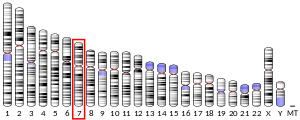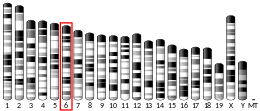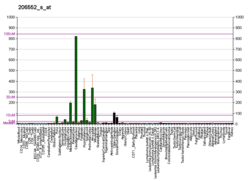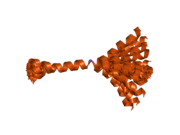TAC1
Preprotachykinin-1, (abbreviated PPT-1, PPT-I, or PPT-A), is a precursor protein that in humans is encoded by the TAC1 gene.[5][6]
Isoforms and derivatives
The protein has four isoforms—alpha-, beta-, gamma-, and delta-PPT—which can variably undergo post-translational modification to produce neurokinin A (formerly known as substance K) and substance P.[7][8] Alpha- and delta-PPT can only be modified to substance P, whereas beta- and gamma-PPT can produce both substance P and neurokinin A.[9]
Neurokinin A can also be further modified to produce neuropeptide K (also known as neurokinin K) and neuropeptide gamma.[10]
These hormones are thought to function as neurotransmitters which interact with nerve receptors and smooth muscle cells. They are known to induce behavioral responses and function as vasodilators and secretagogues. Alternative splicing of exons 4 and/or 6 produces four known products of undetermined significance.[6]
Human basal ganglia
The nature and distribution of PPT-1 has been studied in the human basal ganglia. The protein is expressed evenly throughout the caudate and putamen, and 80 to 85% of it exists in the beta-PPT isoform. 15-20% of the protein is in the gamma-PPT isoform, while no alpha-PPT was detected at all.[8]
Species comparison
In humans, beta-PPT is the dominant isoform in the brain, which contrasts with rats (predominantly gamma-PPT) and cows (alpha-PPT).[8]
While both human and rat PPT-1 produce substance P and neurokinin A, humans produce more neuropeptide K, whereas rats produce more neuropeptide gamma. In cow brains, PPT-1 primarily encodes substance P, but not other neurokinin A-derived peptides.[8]
References
- GRCh38: Ensembl release 89: ENSG00000006128 - Ensembl, May 2017
- GRCm38: Ensembl release 89: ENSMUSG00000061762 - Ensembl, May 2017
- "Human PubMed Reference:". National Center for Biotechnology Information, U.S. National Library of Medicine.
- "Mouse PubMed Reference:". National Center for Biotechnology Information, U.S. National Library of Medicine.
- Chiwakata C, Brackmann B, Hunt N, Davidoff M, Schulze W, Ivell R (May 1991). "Tachykinin (substance-P) gene expression in Leydig cells of the human and mouse testis". Endocrinology. 128 (5): 2441–8. doi:10.1210/endo-128-5-2441. PMID 1708336.
- "Entrez Gene: TAC1 tachykinin, precursor 1 (substance K, substance P, neurokinin 1, neurokinin 2, neuromedin L, neurokinin alpha, neuropeptide K, neuropeptide gamma)".
- Holzer, P. (1988-03-01). "Local effector functions of capsaicin-sensitive sensory nerve endings: Involvement of tachykinins, calcitonin gene-related peptide and other neuropeptides". Neuroscience. 24 (3): 739–768. doi:10.1016/0306-4522(88)90064-4. PMID 3288903.
- Bannon, Michael J.; Poosch, Michael S.; Haverstick, Doris M.; Anita, Mandal; Xue, Iris C. -H.; Shibata, Kazuhiko; Dragovic, Ljubisa J. (1992-01-01). "Preprotachykinin gene expression in the human basal ganglia: characterization of mRNAs and pre-mRNAs produced by alternate RNA splicing". Molecular Brain Research. 12 (1–3): 225–231. doi:10.1016/0169-328X(92)90088-S.
- "MeSH Supplementary Concept: preprotachykinin". www.mentata.com. Retrieved 2016-05-19.
- Takeda, Y; Krause, JE (Jan 1989). "Neuropeptide K potently stimulates salivary gland secretion and potentiates substance P-induced salivation". Proc Natl Acad Sci U S A. 86 (1): 392–396. doi:10.1073/pnas.86.1.392. PMC 286471. PMID 2463627.
Further reading
- McGregor GP, Conlon JM (1991). "Characterization of the C-terminal flanking peptide of human beta-preprotachykinin". Peptides. 11 (5): 907–10. doi:10.1016/0196-9781(90)90007-R. PMID 2284201.
- Harmar AJ, Armstrong A, Pascall JC, et al. (1986). "cDNA sequence of human beta-preprotachykinin, the common precursor to substance P and neurokinin A.". FEBS Lett. 208 (1): 67–72. doi:10.1016/0014-5793(86)81534-4. PMID 3770210.
- Zimmer A, Zimmer AM, Baffi J, et al. (1998). "Hypoalgesia in mice with a targeted deletion of the tachykinin 1 gene". Proc. Natl. Acad. Sci. U.S.A. 95 (5): 2630–5. doi:10.1073/pnas.95.5.2630. PMC 19441. PMID 9482938.





